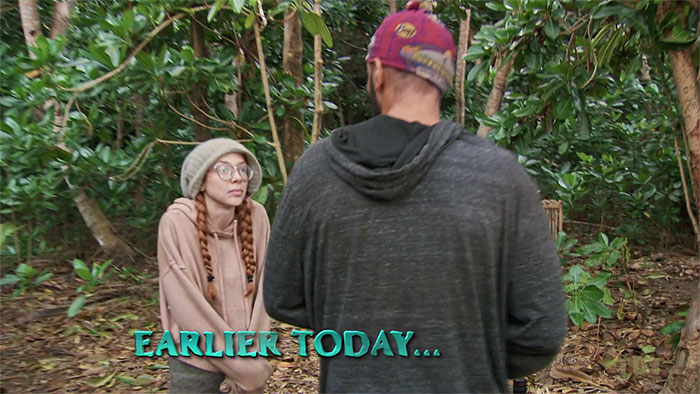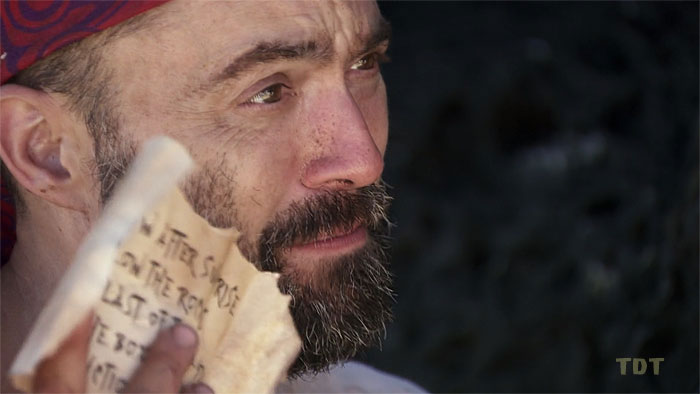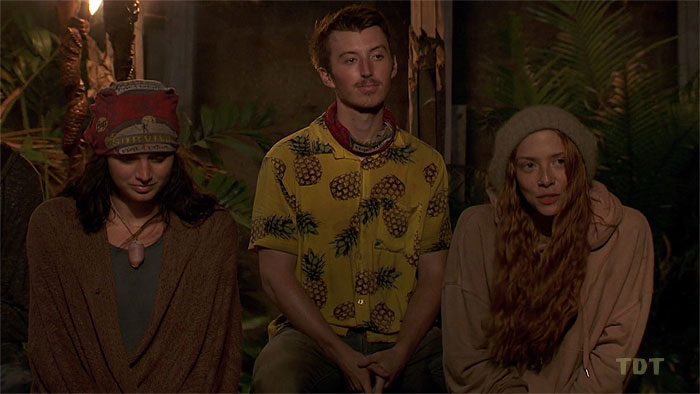

While the main focus of this week's double-elimination episode was rightly (Wrightly?) the loss of the last two returning players, there was also a major advance in both strategy and the show's storytelling technique here, and that was Wardog's flashbacked plan for blindsiding Kelley. Wardog realized he couldn't be seen openly plotting with the people on the bottom after the immunity challenge, since he'd been working so closely with Kelley. So he did his plotting in quick, one-on-one talks "earlier that day," as shown in a fun flashback montage.
Let's set aside the question of whether it was "too early" for Wardog to make such a move: The way this plan was executed (and presented) was innovative and exciting. There was a certain amount of risk involved: the people on the bottom (Rick, Aurora, Victoria, and Ron) had an entire day to leak the plan. Kelley could have won immunity ... at which point Rick could have gone to her, and told her aboutWardog's plan, potentially triggering a counter-strike as revenge for David's boot.
Even with that potential blowback, Wardog's move makes a lot of sense as not being "too early," especially in the context of Ghost Island, the season this cast had just finished watching before they played. Wardog didn't want to risk going to the end with his closest ally, Kelley, only to lose to her in a close vote, just as Domenick did to Wendell. See also Laurel waiting for the right opportunity to flip on idoled-up Dom and Wendell, and never finding the correct time to do so. It's not clear whether Wardog knew about Kelley and Laurel's idols, but by pulling off a clean blindside here, he avoided needing to know. Here he gains an impressive bullet point on his résumé, and possibly wins some jury respect ... at the very least from Aubry.
Is this the first time someone's set up a blindside the morning before an immunity challenge? Most likely not. It's impossible to know for sure how much post-immunity scrambling over the past 37.5 seasons actually took place after the immunity challenge (as shown), and how much really occurred in the hours and/or days before the IC. The show has a fairly standardized format, and it's expected that most of the televised strategizing is confined to the segment between the IC and Tribal Council, except maybe when it's a short-lived plan to target someone who ends up saving themself by winning immunity. So it's quite likely that prior early plans have been time-shifted to that part of the episode (a key tell is when, in the heat of the day, people mysteriously switch from their IC attire of t-shirts and underwear to long sleeves and pants for their alleged pre-Tribal scrambling, which also doesn't match what they end up wearing at Tribal ... of which there are many examples).
But clearly, this was the first time Survivor has shown the plotting in this way, openly out of linear order. This was also a helpful visual cue to explain why Wardog had to make this move at the time he did, in this manner. After a confessional detailing his logic for doing so, it made perfect sense. If having to deploy a flashback after the IC was the editing twist that was required to make this sequence happen, it's great that the show has finally made this leap.
In fact, this wasn't even the first instance of Wardog striking early this episode, since it opened with him collecting and pitching a brand-new six-person alliance before the dust had even settled from last week's chaotic Julia boot. Marshalling the forces to take out your nemesis mere minutes after the previous Tribal Council is some elite-level strategic organizing.
It's still an open question as to whether or not all this work will pay off. Wardog was finally voted against this week, and he's being openly targeted in the preview for the next episode. With eight people left, he still needs to survive four more votes, and let's just say he's not the favorite to win immunity prior to any of those votes. Nor does he seem the likely recipient of any Edge of Extinction advantage largesse.
There are also lingering questions as to whether the other players will respect Wardog's gameplay. Back on Lesu, everyone complained that Wardog's strategic guidance bordered on dictatorial. He was ridiculed as "always plotting" and over-strategizing. He's also mocked for diving and swimming miscues in the reward challenge preview. Still, he has had an impressive record of success. If he can clear the gauntlet of this final stretch of Tribals, that'll be hard to overlook as an argument for victory.
While Wardog may be close to locking down this season's strategic mastermind title, there are clearly other dimensions of the Survivor game where he's less of a standout. It may all depend on what kind of players he would face in the finals. A more subtle, socially oriented original Kama like Ron could easily snag a good portion of the Kama votes. Genial, back-from-Extinction Rick has both obvious friends on the jury (David) and current players who like him (Julie). Alternatively, someone like Aurora with a string of challenge victories would be an interesting contrast to Wardog, and would easily win Joe's vote (although since they were allies, she probably already has it), among others.
A final three with Wardog doesn't seem out of the question, and his presence there would force an interesting decision for the many, many (many!) jurors. Assuming one of the upcoming advantages isn't "remove five jurors," or something.
Trying to parse the opaque rules for advantages

Both at the immunity challenge itself and at Tribal Council Rick openly thanked David for sending him the challenge advantage. This would indicate that he was specifically told that David sent it. In contrast, Aurora, even on the night of the second Tribal Council (in confessional, no less), described her extra vote as coming "from someone on Edge of Extinction." Previously, Aubry also described — in private — her just-given extra vote as a sign that "someone" was looking out for her. This lack of knowledge may explain why we were never shown Aubry and Rick (who sent it to her) discussing that gift during their brief time together on the Edge. This suggests that of these three gift advantages, only Rick was told where his came from. Why?
Was this a mid-season change, and Rick is just the first recipient to have complete transparency about the provenance of his prize? Does an immediate-use challenge advantage require more information than a relatively long-lived extra vote, and if so, why on earth would that be? This season didn't really need more complexity, but for some reason, Survivor apparently feels compelled to keep slathering on additional layers of it.
But wait, there's more! The shot above also shows David holding his hard-won (-found) advantage scroll. It doesn't match in any way the advantage he sent over to Rick, but the few words visible ("[tomorrow?] after sunrise / [fol]low the rope / ... last of [the] ...") do resemble the directions to the re-entry challenge practice/ site that Aubry won (and used) two episodes ago. If so, that suggests that all the post-merge Edge of Extinction advantage finders also receive the challenge practice advantage. Weird that this wasn't shown on the show, but par for the course, apparently. Does it mean anything that the editors chose to show Aubry practicing, but not David?
And even that's not all! One more advantage-related question: Given the lack of full disclosure of advantage-related provenance the show has thus far established, is it possible that Rick's half-idol also came from someone on Edge of Extinction, and was not just placed there for free? (This is less likely, but since the show is obviously hiding stuff, it's worth considering.) It showed up in Rick's bag the day after he returned to the game. Logically, it makes more sense that production would give it to him directly, to (sort of) ease his way back into the game, but as discussed previously, a one-Tribal idol that expired at the merge would have made much more sense there. Is it possible that someone on Extinction sent it to him? And if so, why weren't we told about it?
Edge of Extinction has thus far functioned as an unholy mashup of the Outcasts/Redemption Island (people potentially returning to the game) and Ghost Island (all the advantages), except that here, the Redemption people are all Jacob Derwin, forced to hand over their prize to someone else. This really doesn't seem like the best use of the audience's time. But if we have to sit through it anyway, is it too much to ask that the show properly explain what's happening? Please?
A mostly anonymous, convoluted mess

A common refrain at the live KIA was that while the post-merge has been action-packed and full of big moves, the storytelling hasn't quite caught up. Rob Cesternino jokingly asked, when a completely new six-person alliance immmediately formed minutes after last week's chaotic Tribal: "Did I miss an episode?" It's a valid question.
Clearly, the post-merge has been a vast improvement over the pre-merge, at least in terms of entertainment factor. Sadly, while the success of this has come from the contestants themselves playing their hearts out, Jeff Probst will almost certainly take this as an endorsement of his "so many advantages we don't even have time to show them all" approach.
This season could have been another Millennials vs. Gen X, which had an uneven pre-merge (or at least pre-swap), then shone in its second half. But Edge of Extinction, at least in its current form, with seemingly random strategic shifts coming out of nowhere, and several active characters still virtually invisible (Gavin, Lauren, to a lesser extent Victoria and Aurora), the season is running out of time to right itself. To be sure, there have been some fun editing tweaks and production decisions (this episode'sWardog flashback and the earlier Ron-duping-Joe flashback; last week's decision to expand the focus on an exciting Tribal Council). On the whole, however, the story remains the same: muddled and confusing, with haphazardly (un-) developed characters.
There are two obvious problems: (1) Edge of Extinction is a massive time sink, and (2) there has been too much focus on the returnees, players that we already knew, and who didn't need so much introduction. Unless one of them wins, that now seems like time completely wasted, with all four of them exiled away on the Edge. Now we're left with Wardog, Rick, Ron, and bunch of people we barely know playing the actual game for the final four episodes. Good luck making sense of what's going on the rest of the way.
What's more, a lot of these under-developed new players have actually been quite good at the game and/or proven to be fun characters in their limited screen time. Aurora and Julie have had interesting perspectives when heard from, and have been key to the past few votes. Julie in particular justified flipping on David because she felt unfairly pressured, but the show whizzed right past giving her the time to explain which person was applying that pressure. (Rick at the last Tribal? David the next day? Wardog? Ron? Who knows? Isn't that sort of useful information?) Victoria pulled off a big move in the pre-merge, and has been a delightful character whenever they've bothered to show her: Flashes of world-weary sardonic tone in confessional, strong reaction shots at last week's Tribal, a snarky salute to Probst as he listed her as one of the IC sit-outs this week ... what's not to like?
As with David's unshown practice advantage clue, mostly we're just left wondering what else we've been missing, and why we had to spend so much time on David and Kelley making ultimately futile Spy vs. Spy attempts on each other week after week. (I can get Mad Magazine references too! WTF?!)
Shorter takes

- Subtle changes department: The prior versions of the second immunity challenge ("Paddle Out") required contestants to place six balls on their paddles, not five. Was this slight reduction made to make Rick's advantage more advantageous? (Its Medallion of Power-like 20% reduction in going from five balls to four is slightly better than the 17% reduction from six to five would have been.) Either way, considering that six of Rick's competitors were unable to place even one ball, the show was still astoundingly lucky that this advantage actually paid off.
- Speaking of advantages, what was Aurora thinking? It's not clear how giving away the extra vote for a vague promise of protection by Ron made any sense for Aurora. But Survivor keeps putting the extra vote out there, and it has yet to actually make a difference in a single boot decision, so maybe giving it away (as Adam did with the useless Reward Steal advantage in MvGX) was in fact the best use for it? At the very least, Ron didn't vote against Aurora, so maybe she actually did play a key role in Kelley's blindside, while setting herself up for a future alliance? Who knows? (It's also worth noting that the extra vote expires after just two more Tribals, so it's not exactly a high-value gift.)
- History (partially) made: Once again, the Wardog managed a last-place finish in both challenges, giving him four straight such finishes, but because of factors beyond his control (four sit-outs in the F10 IC, and five fellow no-balls-placed competitors sharing the last-place spot with him in the F9 IC), he managed to almost double his Mean % Finish in individual challenges! All the way up from the abyss of last week's 13.5%, to a semi-respectable 25.9%. Bruce Kanegai can rest easy, his hold on the lowest MPF in a single season record seems safe for another week, if not longer. But hey, at least Wardog is #3 (for now).
- Other history also made: The reverse story, of David's surprising challenge success, is also complete. Or almost complete, anyway, assuming he competes in the final re-entry challenge. By competing in four individual challenges, David accumulated just enough appearances to qualify as the all-time 7th highest single-season Mean % Finish leader, with a sterling 83.2%. He's also #11 on the career MPF leaderboard. Not bad for a guy whose challenge ability Kelley felt the need to disparage as "basically a girl." (Kelley exited the regular game with less than half David's mark, at 39.8%.)
 Jeff Pitman is the founder of the True Dork Times, and probably should find better things to write about than Survivor. So far he hasn't, though. He's also responsible for the Survivometer, calendar, boxscores, and contestant pages, so if you want to complain about those, do so in the comments, or on Bluesky: @truedorktimes
Jeff Pitman is the founder of the True Dork Times, and probably should find better things to write about than Survivor. So far he hasn't, though. He's also responsible for the Survivometer, calendar, boxscores, and contestant pages, so if you want to complain about those, do so in the comments, or on Bluesky: @truedorktimes
- Pitman S38 recaps index
- Pre-season: The evolution of idology
- Pre-season: EoE contestant projections
- Pre-season: The TDT EoE contestant draft
- Pre-season: At the Edge of history?
- Ep.1: The shortest hour
- Ep.2: There's no winning in mixed seasons
- Ep.3: You forgot it in people
- Ep.4: The problem of the perpetual premiere
- Eps.5-6: Rallying back from the brink
- Ep.7: A chance to be daring, swiftly avoided
- Ep.8: Hiding in plain sight: The stealth strategist
- Ep.9: Chaos is a ... pilotable aeronautic vehicle?
- Ep.10: The dawn of Wardog's early-morning strike force
- Ep.11: No more Wardog has the power
- Ep.12: Death by 1000 shows: The edit vs. Rick Devens
- Ep.13: The path not taken
- Pre-Ep.14: Jury Jeopardy
- Ep.14: The dog that didn't bark until the finale